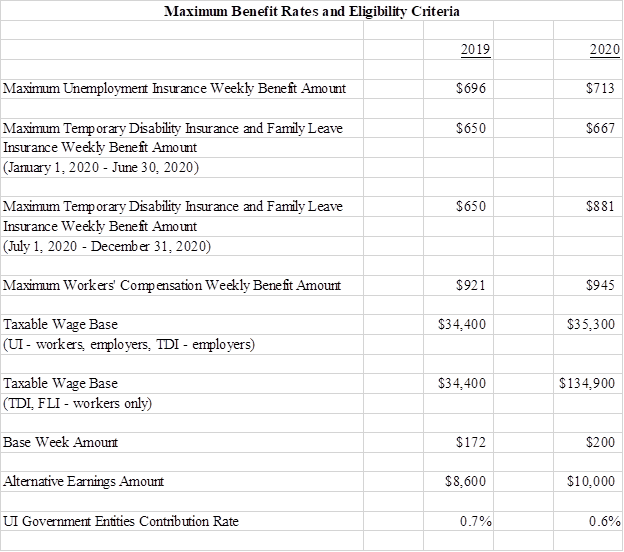The New Jersey Department of Labor and Workforce Development (NJDOL) announced increases in the maximum benefit rates and taxable wage base as of January 1 for its Unemployment Insurance, Temporary Disability Insurance, Family Leave Insurance, and Workers’ Compensation programs.
On January 1, the maximum weekly benefit amount for Unemployment Insurance beneficiaries increased to $713, from $696. The maximum weekly benefit for state plan Temporary Disability and Family Leave Insurance claims increased to $667, from $650, while the maximum weekly benefit for Workers’ Compensation rose to $945, from $921.
The maximum benefit rates and the taxable wage base are recalculated each year based on the statewide average weekly wage, in accordance with the laws governing these programs. The benefit rates and taxable wage base for 2020 reflect the $1,259.82 average weekly wage for 2018, which rose by 2.6 percent from $1,228.25 in 2017.
The level of wages subject to wage taxes in 2020 increased to $35,300 for employers covered under the Temporary Disability Insurance program and for workers and employers covered under the Unemployment Insurance program, the Workforce Development Partnership Program, and Supplemental Workforce Fund for Basic Skills.
Additionally, a law enacted last year (P.L. 2019, chapter 37) increased the level of wages subject to wage taxes effective January 1 for workers covered under the Temporary Disability and Family Leave Insurance programs to cover significant increases in these benefits that go into effect later this year, including a higher maximum benefit rate and an extension in the maximum amount of leave available. The taxable wage base is $134,900 for 2020 for workers contributing to these programs, up from $34,400, or 107 times the statewide average weekly wage, up from 28 times the average weekly wage.
The increase in the maximum weekly benefit rate for Temporary Disability and Family Leave Insurance claims starts July 1, with an increase to $881 from $667. This represents 70 percent of the statewide average weekly wage, up from 53 percent of the average weekly wage. Additionally, the maximum amount of continuous leave will increase to 12 weeks, up from six weeks, and the maximum amount of intermittent leave will increase to 56 days, up from 42 days.
To qualify for Unemployment, Temporary Disability, or Family Leave benefits this year, an applicant must have earned at least $200 per week for 20 base weeks, or alternatively, have earned at least $10,000 during the base weeks. Benefit eligibility criteria are based on the state minimum wage in effect on October 1, 2019, when the minimum wage in New Jersey was $10/hour for most employees.
The contribution rate for state and local government entities that choose to make contributions rather than reimburse the trust fund for Unemployment Insurance benefits paid to their former employees, decreased to 0.6 percent of taxable wages during calendar year 2020, down from 0.7 percent in 2019.
Below is a chart showing the 2019 rates and the changes taking place January 1 and July 1:

To read more about "rates" and workers' compensation, click here.
….
Jon L. Gelman of Wayne NJ is the author of NJ Workers’ Compensation Law (West-Thomson-Reuters) and co-author of the national treatise, Modern Workers’ Compensation Law (West-Thomson-Reuters). For over 4 decades the Law Offices of Jon L Gelman 1.973.696.7900 jon@gelmans.com has been representing injured workers and their families who have suffered occupational accidents and illnesses.
